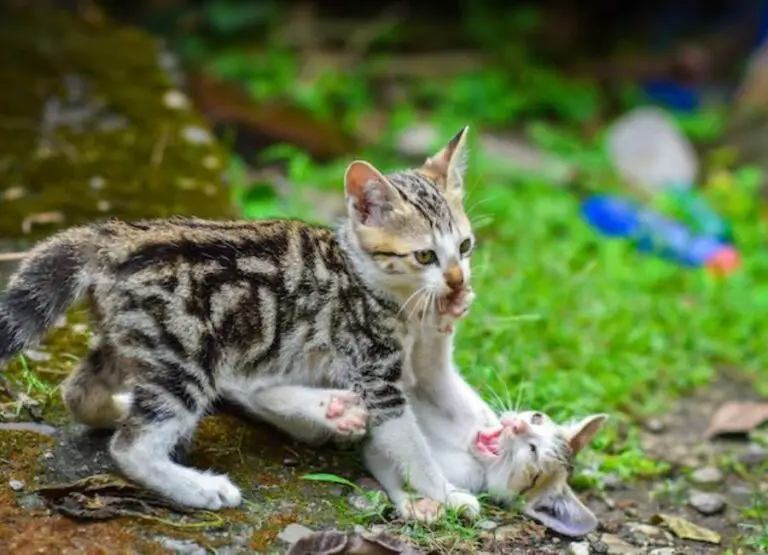10 Common Siamese Cat Behavior Problems & How To Fix Them

Siamese cat owners always want to know about Siamese cat behavior problems, which is exactly what we will be discussing in this post.
In this post, we will outline and discuss all the common and possible Siamese cat behavior problems you should know and expect.
Before drawing up this post, I must say it’s based on real Siamese cat owner’s opinions and online research.
Therefore, every problem listed in this post is coming from real Siamese cat owners and a little online research, sit back and read through.
Siamese Cat Behavior Problems
Siamese cats are more territorial and aggressive than most other breeds of cats.
Lack of attention, hunger, hormonal shifts, the anxiety of a new environment, and obsessive behaviors can all contribute to territorial aggression.
They usually attack other cats rather than people.
Anger can be caused by a lack of focus, hunger, fear, or obsessive behavior.
Here are some common Siamese cat behavior problems you should expect as a Siamese cat owner:
Siamese cats have needy behavior
The extremely loving character of the Siamese cat may be a concern since Siamese cats are known to get too obsessed with their owners and do not fare well when left alone.
If this happens frequently enough, they may develop sadness and anxiety.
They can sometimes become excessively fixated on a single member of the family.
When another cat, pet, or person enters the equation to compete for the attention of the object of their desire, tensions might build, leading to jealousy.
How to fix Siamese cat needy behavior
Here are some common ways to fix Siamese cat needy behavior, which are as follows:
- Make sure the cats have enough of mental and physical stimulation, as well as entertainment such as toys and food searching devices.
- If you can, play with them before you go to tire them out and promote napping while you’re gone.
- If the cats will be alone for an extended period of time, provide them with activities.
- Get two Siamese cats instead of one
- To avoid excessively connected behavior, share the affection with other members of the home.
- Start early socialization.
Siamese cats are prone to separation anxiety
The Siamese cat is extremely intelligent and requires mental stimulation; they are not the sort of cat to maintain if you work 9 to 5.
They like human or animal friends, so if you intend on adopting one and leaving it at home alone, you are making a mistake.
They may develop separation anxiety if left alone for more than 8 hours, and some may become aggressive and destructive.
It has been reported that Siamese cats bite their owners, this was attributed to anxiety.
Signs of separation anxiety in Siamese cats
- Meowing, wailing, or groaning incessantly.
- Eating too quickly or not at all.
- Self-grooming that is excessive.
- Elimination that takes place outside of the litter box.
- Scratching excessively.
- Behavior that is harmful to others.
- Excitement that is out of the norm upon returning from home.
- Attempting to flee.
How to fix separation anxiety in Siamese cats
- Establish a working daily routine
- Exercise and play with your Siamese cat
- Create a stress-free environment for your Siamese cat.
- Desensitize your Siamese cat
- Counter conditioning
- Invest in more treats and toys
- Invest in some antianxiety products
- Get a second cat
- See an animal behaviorist or your vet
- Hire a pet sitter if you are always away
- To stimulate hunting instincts, hide food in toys that require them to work for it.
- Begin by taking shorter absences.
- Leave the radio or television on a station that you listen to frequently while you’re there.
Read more about cats and separation anxiety here.
Siamese cats are extremely vocal on needs
They are renowned for being chatty and loud, which some people find appealing and others find irritating.
This breed is noted for its vocality and talkativeness. They have a distinctive low-pitched meow called the “meezer.”
Their shrill meows can be irritating at times, and some compare them to a baby’s constant screaming.
Their vocalizations are persistent, obnoxious, and obnoxious. A Siamese is not the breed for you if you desire a calm and quiet pet.
Siamese cats meow for everything and everything, even at night, when they are hungry or want attention.
How to handle a vocal Siamese cat
- Provide lots of electronic and interesting toys.
- Create a daily routine or module and stick to it.
- Get another pet
- Start socialization and training as early as possible.
- Provide lots of mental stimulation on a daily basis.
- Invest in treasure hunt toys
- Just get use to their loud meowing
Siamese cats enjoy scratching furniture when bored
Another aspect of Siamese cat behavior to be aware of is their obsessive need to scratch when bored.
While declawing the cat is the most effective approach to solve this problem, some cat owners are opposed to it.
In these situations, Siamese cat owners try to discover strategies to divert their cats’ scratching habit.
Keep in mind that this is a natural Siamese habit, and punishment for it may not be well received.
How to handle Siamese cat from scratching furniture
- The easiest method to handle this is to create a carpeted or wooden scratching post that will allow for this Siamese cat habit while also protecting the home’s furnishings and flooring.
- Never allow your Siamese cat to get bored.
- Get a second cat
- Provide interactive toys
- Provide lots of mental stimulation daily.
- Provide scratch post as much as you can provide.
- It would be preferable if you continued to focus on claw training and educating your Siamese cat not to scratch your furnishings.
Siamese cats can be territorial
Other cat behavior concerns with Siamese cats include their need to be dominant.
The Siamese is an intrinsically clever cat that can detect another cat’s fear or subservience.
The Siamese then preys on that cat in order to establish territory and establish authority.
This cat behavior characteristic is related to Siamese cats’ inherent jealousy.
This is a cat breed that demands to be the center of attention in all settings, and it will bully other animals into submission to achieve this.
How to handle a territorial Siamese cat
- Never punish them for territorial behavior, or they may become more aggressive.
- Squirt fighting cats with water or use a whistle to distract them.
- Keep a regular routine
- Visit other Siamese cat owners as often as possible.
- Socialize your Siamese cat as early as possible.
- Desensitize your Siamese cat.
- Contact your veterinarian.
Siamese cats avoid litter boxes when bored
Siamese cats tend to avoid litter boxes when bored or ill.
It’s most common when you first bring your Siamese cat home, and it might suggest a lack of litter boxes in their new home or a need for a cleaner litter box.
Siamese cats sometimes develop litter box difficulties when you bring a new family member home, even if they haven’t shown any indications of it previously.
Anxiety or a lack of comfort in your Siamese cat’s habitat might be one reason for frequent litter box issues.
How to fix Siamese cats litter box issues
- Provide lots of exercise for your Siamese cat
- A medical problem should be investigated if your Siamese cat starts avoiding the litter box for no apparent reason.
- Provide lots of mental stimulation for your Siamese cat.
- Provide lots of entertainment for your Siamese.
- A veterinarian visit should be made to rule out medical reasons.
- You should also provide numerous litter boxes for your Siamese cat.
- Get a second pet to keep your Siamese cat busy.
Siamese cats are easily depressed
Siamese cats are recognized for their high levels of energy, activity, and vigor. They enjoy being kept active at all times.
Most Siamese cats develop depressions as a result of separation anxiety, loneliness, or a continuous change of habit.
If a Siamese cat’s melancholy isn’t addressed, it might escalate to unnecessarily aggressive behavior against other family members.
A sad Siamese cat may flee at any chance and become a wild cat, or it may resort to biting and nipping.
Signs of depression in Siamese cats
Here are some common signs of depression in Siamese cats:
- Excessive licking
- Refusal to use litter box
- Uncontrollable urination
- Destructive chewing
- Biting
- Hiding or avoiding behavior
- Refusal to eat
- Unnecessary pawing
- Excessive scratching
- Excessive sleeping
How to fix a depressed Siamese
Here is how to help a depressed Siamese cat which is as follows:
- Start a mental-stimulating activity, such as puzzle games.
- Treats and food with a strong odor should be provided.
- New and engaging toys, such as the electronic fish, should be available.
- Take your Siamese cat for a stroll in the evening.
- Spend some extra time with your Siamese cat.
- Create a clean window with a nice view of the outside world.
- Purchase a new cat tree or shelves for your home.
- Make an appointment with your vet or animal behaviorist.
Siamese cats can be destructive when bored
When bored, Siamese cats are prone to destructive activity.
A Siamese cat will inflict more harm than an ordinary alley cat if bored and able to escape.
This is because they are high-energy cats who demand a lot of mental and physical activity.
Getting a Siamese cat is a mistake if you aren’t always around or if the cat doesn’t have a companion.
Boredom and this all-too-common problem behavior are inextricably linked.
If Siamese cats aren’t given enough stimulation, they might become destructive.
It’s simple for them to grow bored because they’re such high-energy cats.
How to fix a destructive Siamese cat
- Provide lots of exercise
- Provide lots of mental stimulation.
- Talk to your vet.
- Invest in interactive toys
- Desensitize your Siamese cat
- Show more affection
- Reward your cat only on positive behavior
- Use positive reinforcement.
- Re-socialize your Siamese cat.
Siamese cats can engage in compulsive behavior
Siamese cats are prone to compulsive behavior, such as biting or licking themselves on a regular basis.
They may also suck wool or other fabrics or engage in pica, or non-food consumption.
This behavior usually begins before the age of two, so if you notice your cat doing any of these things on a regular basis, it’s time to contact your veterinarian.
Siamese cats can get into play aggression
Play aggressiveness is the most prevalent type of cat aggression in Siamese cats, and it generally manifests itself as your cat roughhousing.
Your Siamese can get into highly rough play that can hurt you if you don’t have adequate training.
Siamese cats, in my opinion, play vigorously and when they become furious and slam a toy across the room, they give it their all!
Make careful to keep your Siamese cat’s nails trimmed to avoid the risk of damage.
How to stop unwanted behaviors In Siamese cats
Here are some interesting tips to help you stop some unwanted behaviors in your Siamese cat:
- Recognize and treat your Siamese cat’s emotional and physical needs.
- Assist your Siamese kitten in developing good habits.
- Your Siamese cat must be properly socialized from the time it is a kitten.
- A second pet should be supplied, either a cat or a dog.
- If you don’t have to, don’t shout at your cat.
- Be patient and make the required changes.
- Examinations by a physician are required.
- Invest in a huge quantity of toys.
- Give your cat some exercise every day.
- Give them a routine and make sure they understand how things operate in your home.
- Turn on the radio or turn on the television; soothing music and relaxing noises might help your cat relax.
- Make sure they’re spayed or neutered, or, if they’re female, consider breeding them.
Read more about the pros and cons of owning a Siamese cat.



![New Cat Hiding And Not Eating [Explained] New Cat Hiding And Not Eating](https://petcreeks.com/wp-content/uploads/2023/02/New-Cat-Hiding-And-Not-Eating-768x555.jpg)


